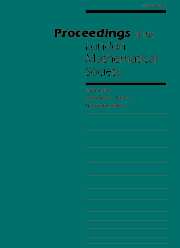Article contents
LITTLEWOOD-TYPE PROBLEMS ON [0,1]
Published online by Cambridge University Press: 01 July 1999
Abstract
We consider the problem of minimizing the uniform norm on $[0, 1]$ over non-zero polynomials $p$ of the form
$$p(x) = \sum_{j=0}^n a_jx^j \quad\text{with } |a_j| \le 1,\, a_j \in {\Bbb C},$$
where the modulus of the first non-zero coefficient is at least $\delta > 0$. Essentially sharp bounds are given for this problem. An interesting related result states that there are absolute constants $c_1 > 0$ and $c_2 > 0$ such that
$$ \exp (-c_1 \sqrt{n} ) \le \inf_{0 \ne p \in {\cal F}_n }\|p\|_{[0, 1]} \le \exp (-c_2 \sqrt{n}),$$
for every $n \ge 2$, where ${\cal F}_n$ denotes the set of polynomials of degree at most $n$ with coefficients from $\{-1, 0, 1 \}$. This Chebyshev-type problem is closely related to the question of how many zeros a polynomial from the above classes can have at $1$. We also give essentially sharp bounds for this problem.
{\em Inter alia} we prove that there is an absolute constant $c > 0$ such that every polynomial $p$ of the form
$$p(x) = \sum_{j=0}^n a_j x^j, \quad\text{with } |a_j| \le 1,\,|a_0|=|a_n|=1,\, a_j \in {\Bbb C},$$
has at most $c\sqrt{n}$ real zeros. This improves the old bound $c\sqrt{n\log n}$ given by Schur in 1933, as well as more recent related bounds of Bombieri and Vaaler, and, up to the constant $c$, this is the best possible result.
All the analysis rests critically on the key estimate stating that there are absolute constants $c_1 > 0$ and $c_2 > 0$ such that
$$|f(0)|^{c_1/a} \le \exp (c_2/a)\|f\|_{[1-a,1]},$$
for every $f \in {\cal S}$ and $a \in (0, 1]$, where $\cal S$ denotes the collection of all analytic functions $f$ on the open unit disk $D := \{ z \in {\Bbb C}: |z| < 1 \}$ that satisfy
$$|f(z)| \le \frac{1}{1-|z|}\quad \text{for } z \in D.$$
- Type
- Research Article
- Information
- Copyright
- London Mathematical Society 1999
- 43
- Cited by




